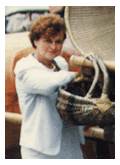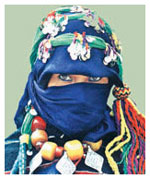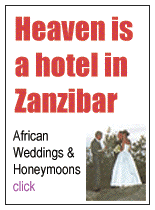
About
Morocco
I
gave Yasmina a silver chain as a wedding
gift, since silver brings good luck. Many
Westerners think that Moroccans purchase
their wives at the fair, but in truth,
marriage depends on mutual consent and
family approval. Once
this happens, the newly acquainted boy and
girl unite, holding hands as a sign of
intent. Male relatives who accompany the
bride-to-be lend advice, often making snap
judgment calls at first sight. If
rejection is signaled by a broken
handclasp, it's time to look elsewhere.
When
a bride does give consent, she may speak
the magic phrase," You have captured my
liver." Since a healthy liver aids
digestion and promotes well-being, in
Berber culture it's the liver, not the
heart that's considered the location of
true love. Might one say, "Darling, my
liver pines for you?" Often snowbound
behind village walls for up to six months
a year, the new couples must learn to live
in harmony. Despite those old Foreign
Legion movies from the 50s, which showed
Berbers as being fierce, hot tempered and
warlike, they believe in "paix chez eux"
(peace at home). History
and culture Muguette
Goufrani, E-mail
Muguette
with your own travel
experiences in Morocco Tel:
(212) 557-2520 Fax: (212)
949-9148 OLIVE
BRANCH TOURS: http://www.olivebranchtours.com/ Photo
Credits: Morocco National Tourist
Office / Izza Goufrani, Gulf Air
/ Muguette Goufrani / Thierry
Mareschal

Morocco
Index
Agadir
Casablanca
Essaouira
Fès
Imilchil
Marrakech
Meknès
Moulay
- Idriss
Rabat
Tangiers
Volubilis
Atlas
Mountains
Attractions
Airlines
Attractions
Background
Berber
Culture
Berber
Wedding
Ecotourism
Food
and Dining
Handicrafts
Investment
Kasbahs
and Deserts
Medieval
School
Morocco
Map
Transportation
Travel
Capsules
Services
Blue
Men of Morocco
Mistral
Travel
Olive
Branch Tours
Riads
![]()
Berber
Wedding Fair at Imilchil
by
Muguette Goufrani
 My
father, who owned and operated a tour
company in Casablanca, Morocco for many
years, took me along with a German tour
group to visit a traditional "Wedding
Fair" at Hadiddou Imilchil, a Berber
village in southern Morocco. While I knew
that many Berber Fairs combine a local
Saint's Day with a regional market event,
only at September's 'moussem' (pilgrimage)
of Imilchil, have I seen such a colorful
pageant, with instant engagement, and a
mass exchange of marriage vows. Berbers
have inhabited North Africa for centuries,
some being of Caucasian ancestry, with
fair complexions and blue eyes. Visitors
may think of Berbers as exotic outsiders,
yet they preceded the Arabs in settling
Morocco, and they remain the country's
main culture. This is expressed by the
phrase, "Morocco is Berber - the roots and
the leaves of freedom."
My
father, who owned and operated a tour
company in Casablanca, Morocco for many
years, took me along with a German tour
group to visit a traditional "Wedding
Fair" at Hadiddou Imilchil, a Berber
village in southern Morocco. While I knew
that many Berber Fairs combine a local
Saint's Day with a regional market event,
only at September's 'moussem' (pilgrimage)
of Imilchil, have I seen such a colorful
pageant, with instant engagement, and a
mass exchange of marriage vows. Berbers
have inhabited North Africa for centuries,
some being of Caucasian ancestry, with
fair complexions and blue eyes. Visitors
may think of Berbers as exotic outsiders,
yet they preceded the Arabs in settling
Morocco, and they remain the country's
main culture. This is expressed by the
phrase, "Morocco is Berber - the roots and
the leaves of freedom." While
the Wedding Fair is key part of Berber
marital custom, families usually arrange
marriages in their home village. Women are
free to divorce and remarry. At the
moussem, divorced and widowed women form
the majority, and are identified by their
pointed headdress. The courtship is a
family affair as I learned after accepting
an invitation to drink mint tea in the
goat hair tent of a Berber elder. His
oldest daughter Malika, prettied up her
divorced 18 year old sister Yasmina with
traditional beauty aids - rubbing saffron
colored powder into her sister's eyebrows,
applying kohl to outline her eyes and
carmine rouged to her cheeks. A wool cape,
striped in tribal colors, covered her
white dress; then a cone shaped headdress
was assembled, held on by loops of
spangled wool.
While
the Wedding Fair is key part of Berber
marital custom, families usually arrange
marriages in their home village. Women are
free to divorce and remarry. At the
moussem, divorced and widowed women form
the majority, and are identified by their
pointed headdress. The courtship is a
family affair as I learned after accepting
an invitation to drink mint tea in the
goat hair tent of a Berber elder. His
oldest daughter Malika, prettied up her
divorced 18 year old sister Yasmina with
traditional beauty aids - rubbing saffron
colored powder into her sister's eyebrows,
applying kohl to outline her eyes and
carmine rouged to her cheeks. A wool cape,
striped in tribal colors, covered her
white dress; then a cone shaped headdress
was assembled, held on by loops of
spangled wool.
A nod and a wink: The language of gesture
is as clearly understood by these people
as the spoken word. By having a friend
help him choose a bride (with often no
more than a silhouette and two dark eyes
as a clue) the groom gets overcomes his
shyness. All day long, in pairs, these men
weave in and out amongst a cluster of
anxious brides. Then, welcomed by a shy
glance or a quick nod, the suitor will
stop to speak to the lady, encouraged by a
signal from his friend's reassuring
hand. Moroccan
food
Moroccan
food
Who wouldn't enjoy steamed semolina,
topped with a meat and vegetable sauce
called couscous? Or tajines. a vegetable
stew that may contain rabbit, lamb, goat
and chicken meat, combined with prunes,
apricots or raisins. Pastilla (baked
pigeon pie) is made of layered filo
pastry, with nuts and spices, and coated
with sugar. With your morning coffee, try
a light deep fried Spanish doughnut, we
call sfinj, or cornes de gazelle
pastries.
Most of the 27 million Moroccans are
Berbers, Arabs or Moors (people of mixed
Berber and Arab descent), whose ancestors
built the mighty Moorish empire that once
ruled Spain, Portugal and most of Northern
Africa. Most Berbers dwell in the
mountains, while the Arabs and Moors live
on the plain and desert. Most cities have
a European section a Jewish enclave, and a
Medina (Arab-Moorish section). Over the
past 3,000 years, its geographic location
has given Morocco a strategic importance
far beyond its small size. The country has
taken the best from the Phoenicians,
Romans, Arabs, Berbers, Portuguese,
Spanish and French.
Africa Travel Magazine's
Associate Editor covers
destinations and events in
Francophone Africa. She has lived
in five West African countries,
working for Air Afrique, Royal
Air Maroc and Citroen. As a
Travel Agent, she worked in North
Africa, where her family operates
an inbound tour company, and
later in Tahiti and Cambodia.
Dear Muguette,
Since I read your article
about
Morocco,
we took a group of African
American Female educators
there last year and had a
wonderful time. Hope to take a
group again next year.
Briefly, the experience was
wonderful. We spent most of
our time in Agadir with a one
night excursion to Marrakech.
We stayed at Club Valtur and
the resort was great, albeit
very Italian. I didn't learn
much about the people or
culture of Morocco, hence the
need for a second trip.
However, I did make a few
friends (smile). Morocco is a
fascinating if you love
sensory experiences or sensory
overload!!
Pamela
and other North or West
African
destinations.
MOROCCO NATIONAL TOURIST
OFFICE
PO Box 22663, Buena Vista, FL
3820 Fax: (407) 370-4822
